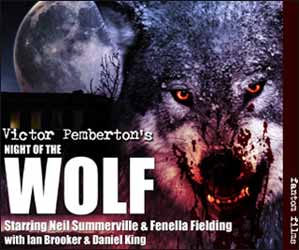|
Click here to return to the main site. Audio Drama Review
It's the late 1880s. After hearing the shocking news of his son Robert's death, Judge Matthew Deacon makes the journey from America to Cambridge University here in England in order to get to the bottom of the circumstances. He soon discovers a suicide note was left but that his body has not been found. Now convinced Robert might still be alive, he is approached by his son's best friend, Griffin, who informs Matthew of Robert's relationship with a beautiful young woman called Dorothy Northcott. The Northcott mansion is set amidst miles of desolate moorland. People seen reticent to venture on to the land after dark, and the name carries a fearful dread. However, Matthew is no shrinking violet. He visits the house looking for his son, and meets the cold head of the family, Mrs Northcott. Here he slowly uncovers a chilling family secret which extends back generations to when the house was built... If Dark was a traditional ghost story in a (then) contemporary setting, then Night of the Wolf is similarly a traditional werewolf story in a more formal past setting. Victor Pemberton appears to be a very meticulous script writer, in this instance assuming that many listeners will possess no knowledge of previous tales of lycanthropy. In this sense it does cover every minute step of the mythos, but to those brought up on the tasty morsels that were the Universal monster movies and Hammer Horror this audio will come across as painfully slow. As many period pieces are, it's also over-dramatic in places. Matthew doesn't always react in the manner in which you would expect. Both as an educated man (a judge in America) and a scholar (his referenced researches in the supernatural field), it's simply inconceivable that Matthew would not previously have heard stories or fables about the manwolf, the full moon and silver bullets. The pacing may be awfully slow, but the acting and characterisation is spot on. Fenella Fielding is outstanding as Mrs Northcott. When there are only inflections in the voice to base a reaction upon, rather than revealing expressions, it becomes all the more important to convey meaning - and this comes across succinctly, as it should. Another nicely understated performance is Ian Brooker's Professor Forrester (a sort of James Bond's Q). So, very competently handled, and compelling in small doses, but rather tedious for a single-sitting. 6 Ty Power |
|---|

